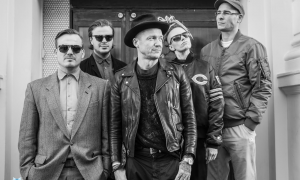Home » Jazz Articles » Live Review » The Randy Weston African Rhythms Trio at Birdland
The Randy Weston African Rhythms Trio at Birdland
Birdland
New York, New York
October 3, 2007
The extremely tall Weston hunkers over his dwarfed piano, looking years younger than his eight decades ought to allow. He's in relaxed mode for this intimate late-night gathering on the opening night of his residency. The African experience has been central to the Brooklynite Weston's musical life from a very early point, even though it took him a while to actually steep himself in the continent's culture.
This is the smallest manifestation of Randy's African Rhythms concept, a trio that are all seeking to be percussionists, though only one of them officially inhabits that role. Neil Clarke sits surrounded by congas, with Weston choosing not to employ a conventional drummer, but bassist Alex Blake and the leader himself are almost equally concerned with rhythmic attack: the sharply struck string and the staccato pulse. The ensemble has become a regularly working unit, and it shows in their intuitively connected state throughout the evening's performance.
The African element exists as an attitude, a spiritual presence rather than an attempt to deliver authentic roots music from the continent, though Weston has in the past collaborated with, for instance, Moroccan Gnaoua master musicians. Curiously, there's a strong jazz standards foundation to the repertoire, and also a heavy ratio of African music as filtered through its later Latin manifestations. Weston isn't emphasizing his own strong songbook—though there's an early rendition of "African Sunrise"—but playing numbers by Machito and Ellington, highlighting the music's fusion of ethnicities. Indeed, Ellington-Tizol's "Caravan" is the set's centerpiece, an extended journey that allows each member to display his considerable wares.
This eclecticism does call attention to the trio's only problem, which is a tendency to be so democratic, so concerned with solo expression that each piece begins to break down into a series of almost completely isolated grandstands, which risks showcasing each soloist at the expense of the tune's overall momentum. Also, Blake and Clarke can't keep their mouths shut, vocalizing almost all the time as they solo. These voice- and-instrument couplings are technically well-managed, but perhaps overdone as the set progresses.
Tags
PREVIOUS / NEXT
Support All About Jazz
 All About Jazz has been a pillar of jazz since 1995, championing it as an art form and, more importantly, supporting the musicians who make it. Our enduring commitment has made "AAJ" one of the most culturally important websites of its kind, read by hundreds of thousands of fans, musicians and industry figures every month.
All About Jazz has been a pillar of jazz since 1995, championing it as an art form and, more importantly, supporting the musicians who make it. Our enduring commitment has made "AAJ" one of the most culturally important websites of its kind, read by hundreds of thousands of fans, musicians and industry figures every month.
























